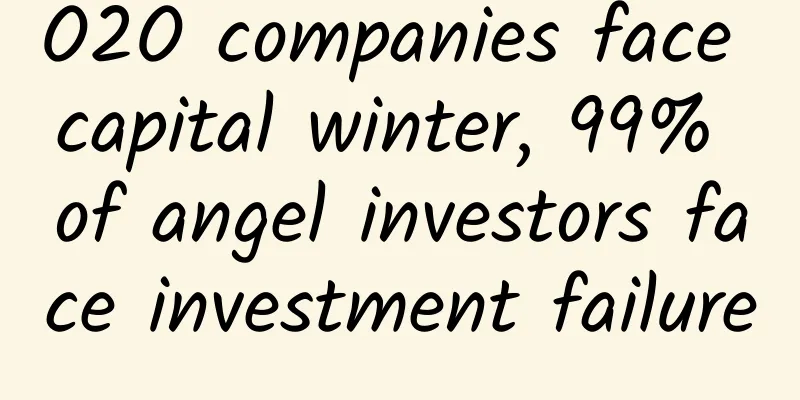O2O companies face capital winter, 99% of angel investors face investment failure

|
"In the capital winter, a large number of community-based O2O startups will go bankrupt." Over the past month, major stock markets around the world have continued to be turbulent, and concerns and discussions about the economic crisis have been rampant. The continued downturn in the secondary market is having an increasingly greater impact on the domestic venture capital market, pouring cold water on the current hot entrepreneurial wave. Yimutian, an agricultural B2B platform that had been gaining momentum, was recently reported to have laid off a large number of employees. Analysts pointed out that the superficial reason for Yimutian's dismissal of employees was that these employees were suspected of fraudulently increasing sales by faking transactions, but the more fundamental reason was that Yimutian's Series C financing was delayed and it had to cut costs. "If Ele.me does not raise enough money in this round of financing, it will also lay off a large number of employees." An investor told Tencent Technology. On August 27, the food delivery platform "Ele.me" just announced that it had completed a $630 million financing. Although it was questioned for exaggerating the amount of financing, this move was intended to boost the confidence of its partners and employees in an unfavorable economic environment. And yesterday, Phoenix New Media also announced the launch of large-scale layoffs. Officials said that in the context of a poor economic environment, the company's performance has encountered periodic challenges and its stocks have been oversold. In order to stay ahead of the trend, the company must transform and slim down. Ele.me, Yimutian, and Phoenix New Media are trying their best to resist risks, and more money-burning Internet companies, especially various O2O money-burning companies, may become the hardest hit areas in the new round of layoffs, and a large number of start-ups among them may even face the risk of bankruptcy. This will inevitably affect the investment institutions behind the companies. SAIF partner Yang Dong said that 99% of angel investments may fail in this round; Blue Lotus founder Wen Tianli said that most angel investors will end their investment careers in a "charity" way. The embarrassment of O2O enterprises burning money: they cannot burn out the future This year, many platforms provide free breakfast to consumers, and some fresh food companies give away peaches as long as you register. Taking a taxi is so much cheaper than taking a taxi that some people joked that "the living standards in big cities have risen a lot recently because VCs around the world have invested tens of billions of dollars, which are basically subsidized to people in Beijing, Shanghai and Guangzhou." The series of changes in the development of the O2O industry made 360 Chairman Zhou Hongyi sigh, saying that making antivirus software free was a "revolution" at the beginning, but now the world has changed. The Internet business has changed its way of playing. It is no longer free, but paid for. Zhou Hongyi, who is known for his toughness, doubted that he was not aggressive enough. "Some companies subsidize 200 million yuan in one month. The young are really formidable." Against the backdrop of massive money burning, a new O2O2VC model has emerged in the market: the more money a startup burns, the higher its valuation. Zhou Hang, CEO of Yidao Car, said when discussing this phenomenon, in the last round of Internet bubble, people mainly spent money to buy traffic, which was more important than anything else. In this wave of mobile Internet, especially in the field of O2O life services, the most core parameter is orders. "Everyone only cares about how many orders there are in a day. At present, the core rules of some industries are still price and capital. Some competitors come in and offer free services just for order data. They are very crude and directly offer free services." Zhou Hang told Tencent Technology that the order bubble is very huge, and many things in the market are seriously distorted by prices, only to expand the market size while ignoring the core services of the industry itself. As the overall capital environment cools, more and more investors are wondering whether the original corporate money-burning model can continue. SAIF Partner Yang Dong told Tencent Technology that companies can burn money, but the key is to burn out results. Investors value two things: 1. Burning money can lead to rapid growth; 2. Burning money efficiently can lead to a stable company. "For many companies, I can't tell whether they can stay stable after burning through all the money. If they can't stay stable even if they keep burning through all the money, then there's a problem." Yang Dong believes that transportation sectors like Didi Taxi can be successful, but 90% of O2O businesses in China are questionable. For example, for excellent doctors, it is most efficient to sit in the hospital and wait for patients to line up for treatment, rather than providing door-to-door medical services. "For another example, many people require that the products they receive are cheap, reliable, can be delivered to their homes, and must be personalized to form a so-called flexible supply chain. I think this is unreliable. Factories will definitely give priority to providing services to big brands." Wu Jiong, former CTO of Alibaba Group and current founding partner of Fenghe Investment Management Company, even directly looked down on the O2O model of food delivery. Wu Jiong believed that the online food delivery model had problems and was going against the historical trend. It could no longer rely on burning money to expand its market share. Wu Jiong's logic is that China's labor costs are rising, and the cost of couriers will become more and more expensive, rather than cheaper. In comparison, the buffet model should be the most efficient. Most angel investments face failure In August this year, laundry O2O company "e袋洗" announced that it had completed a $100 million financing, led by Baidu, followed by Matrix Partners China and SIG. This is another round of financing for "e袋洗" after it received $20 million in financing from Matrix Partners and SIG in November 2014. However, Zhang Rongyao, chairman of e袋洗, also encountered a very depressing thing. Since "e袋洗" became popular, startups imitating "e袋洗" have sprung up all over the country, totaling thousands, and some have even received financing from traditional companies. A large number of companies imitating e-bag wash have not figured out their own business models, nor have they expanded. They only operate in a specific area or even in a certain community. Zhang Rongyao told Tencent Technology that starting a business is a matter of life and death, and "e袋洗" has 20 years of experience in the laundry industry. To do O2O, you must truly pay attention to users and social efficiency, and have a strong sense of mission, rather than just speculating. Zhang Rongyao said that when he visited companies such as Google and Facebook in the past two years, he deeply felt that these companies have real passion and truly serve users, while many Chinese entrepreneurs are too far away from users, and this passion has become a slogan. "In the capital winter, a large number of these community-based O2O startups will go bankrupt. In the end, they will waste a lot of manpower and logistics, and occupy a lot of investors' resources." Of course, even if a company like Ele.me receives hundreds of millions of dollars in funding, it does not mean that it is truly safe from now on. The last once-popular Internet company to receive a round F funding was Vancl, whose current situation can only be described as "miserable survival." After a continuous inventory backlog and layoffs, Vancl CEO Chen Nian and his Vancl's status in the Internet world has plummeted. An investor told Tencent Technology that Meituan, which recently sought to raise $1 billion, has also been affected by the capital winter. Its valuation has dropped from the original $15 billion to more than $10 billion. If the financing is not in place, Meituan may also lay off employees. The above-mentioned person said that this round of capital winter has disrupted the original chain of companies burning money. If the capital winter lasts for one year, many Internet companies that burn a lot of money may find it difficult to continue, or go bankrupt, lay off employees, or be acquired by other companies. Wu Jiong, former CTO of Alibaba Group and current founding partner of Fenghe Investment Management Company, said that if we use the four seasons to describe the capital market, there may be no autumn and spring. It only takes 3 to 5 months to go directly from summer to winter, but it takes a long time from winter to summer. SAIF Partner Yang Dong pointed out that Lei Jun has a basic principle in angel investment, which is to invest in people he is familiar with and things he really understands. However, the number of angel projects that Lei Jun actually invests in is very limited, and there are probably only more than 20 that can be counted. This brings troubles to angel investment. The reason is that if angel round projects cannot find round A financing, many will go bankrupt. Wen Tianli, founder of Lotus Institute, said that most angel investors end their personal investment careers in the form of "charity". "Currently, many angel investors can invest in 50 projects at once, and most of them are happy if they don't fail." Yang Dong said that the failure rate of angel investment is 99%. Angel investors will definitely get hurt if they invest too much in unreliable projects. Once a project has problems, these angel investors. It is not just angel investors who are hurt. Many institutions that blindly invest in the New Third Board will also be hurt. Well-known investor Wang Gongquan recently told the media that many people are inexperienced and are scrambling to drive up prices. "I think at least half of the companies will die on the New Third Board." Wang Gongquan’s so-called “death” means “I can neither move forward nor retreat, and I would rather not list on the New Third Board than regret it.” Wang Gongquan said that investment cannot be gambled in this way, and professionals should be allowed to do professional things. |
<<: Top 10 Core Data tools and open source libraries loved by developers
>>: What kind of team is more likely to succeed in making games?
Recommend
Snow leopard, why is it the king of the snow mountains?
October 23, 2021 World Snow Leopard Day · Special...
When the air-conditioning industry encounters turmoil, should it engage in a price war or a quality war?
Here, several competing domestic mobile phone man...
CCTV exposed: The "100% cashmere" in the live broadcast room actually does not contain a single strand of cashmere! Expert interpretation →
Cashmere sweaters are very popular among consumer...
You have to wear a mask when you go out every day. Are you really wearing it correctly?
The weather is getting hotter. Do you always want...
Is it true that chicks can be hatched without a shell?
Yesterday, I talked to you about "How to cra...
The traffic rules behind the popularity of Douyin live streaming rooms
Can you believe it? The live broadcast room has o...
Nangong Guoer "Pinduoduo Product Planning and Explosive Product Creation"
This Taobao series of courses explains in all asp...
How can Apple TV win in the North American market where there are so many experts?
At this year's Apple autumn conference, the a...
We used the recently popular DeepSeek to challenge the competition questions issued by the Institute of Physics, and the result was...
Recently, DeepSeek-R1, an open source large model...
The most searched topic! After having an erection, be sure to be alert to this disease
recently Various rumors circulating on the Intern...
Teach you step by step how to promote information flow videos!
Currently, the trend of online video advertising ...
Tech Neo October Issue: Concurrency Optimization
51CTO Network+ Platform launched the "TechNe...
The melee of China's low-code development platforms - Let's clarify low-code once and for all
Today we will talk about low code in a language t...
What is data-driven design?
Data-driven design innovation is a new and import...









